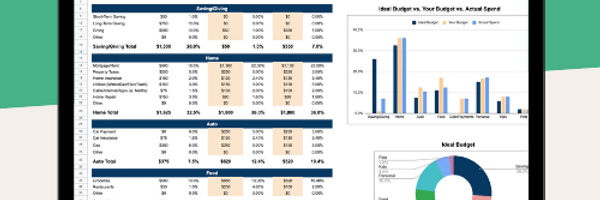There is one fact about money most people will agree with: There never seems to be enough of it. Paying bills can be stressful, and the lack of financial resources can strain relationships too. Fortunately, creating a budget can help families to plan their expenses and meet their monthly obligations.

Simple, quick, and easy monthly budget template for Google Sheets and Excel.
With this template, you will get:
Pre-set expense categories
Simplified dashboard and day-by-day monthly tracker
Automated charts for comparison
Day-by-day views for budgets and actual spend

Family Finances
Unless a household has experienced the loss of a critical source of income, there is one undeniable truth:
Individuals make decisions all the time that affect their ability to stay out of debt.
Additional Resources |
Household Budget Basics Budget WorksheetSaving Money Surviving a Recession Staying Out of Debt Financial Planning After a Death |
Budgeting is all about choosing between the available options, including those that will help a household to reduce their outstanding debt.
For example, the budget might reveal there is enough money to pay the electric bill each month, but going out to eat twice a week costs even more than electricity. Utilities are an essential household expense, paying those bills can be categorized as mandatory. While everyone needs food to survive, eating out at restaurants is a luxury; this is what is referred to as a discretionary expense. It really isn't necessary, and there might be some less expensive options.
Creating a Budget
Anyone who's been paying bills for at least 12 months will have enough data to create a family budget. With that much information, it's possible to accurately determine how much is spent each month on food, clothing, and entertainment. Creating a budget is all about pulling that information together, and organizing it into a form that can be analyzed. Businesses do this all the time.
This website already publishes a series dedicated to the topic of household budget basics. In this article, we're going to supplement that information with three additional tools.
Spreadsheets and Calculators
The aim of the two worksheets we've created is to help individuals compare the budget they create to the expenses of an average family. Using information gathered by the Bureau of Labor Statistics, the following tools can be used to help prepare and guide individuals through the process of creating a budget. The nice feature of these tools is they don't require any special software to get started.
Family Budget Calculator
The first tool is a family budget calculator that allows individuals to compare their monthly expenses (or annual costs) to that of an average family. This calculator allows the user to input their monthly or annual expenses in each of fourteen different cost categories. The calculator then compares the user's spending patterns against those of an average family as measured by a survey conducted by the Bureau of Labor Statistics.
Family Budget Spreadsheet
The next tool offered is a family budget spreadsheet. This tool allows individuals to go through a monthly budgeting process.
We also offer downloadable monthly and weekly budget templates, as well as a customizable budget spreadsheet without timeframes. The spreadsheets can be used to see the effect of varying assumptions. The end user also has the option to print out each scenario and make visual comparisons.
The user can not only create a budget but also enter their actual expenses during the year. This allows for the tracking of variances, which are the differences between the planned and actual costs. For example, $2,500 may have been budgeted for a family vacation, but $3,000 was spent. The spreadsheet would indicate a budget variance of $500.
Average Family Budget
Finally, we also created average family budget spreadsheet. By entering the family's monthly income, and desired level of savings, this spreadsheet uses the information for an average family to project the spending levels for each of fourteen different expense categories. Anyone looking for examples of what an average family's budget is for everyday household expenditures will want to take a look at the results of this worksheet.

Simple, quick, and easy monthly budget template for Google Sheets and Excel.
With this template, you will get:
Pre-set expense categories
Simplified dashboard and day-by-day monthly tracker
Automated charts for comparison
Day-by-day views for budgets and actual spend

Budgets that Work
Here we're going to finish up with two simple rules that are essential to creating an effective budget. There is additional information on this topic in our budget worksheet series, which contains a step-by-step approach to creating a family budget.
Simple Rules
No matter how determined someone is to make a budget work, it has to follow this one simple rule:
Family Income must be greater than Family Expenses
Individuals that find themselves on the verge of bankruptcy are in that situation because they chronically break this simple rule. Without the right balance, there are only two choices:
Increase family income
Decrease family expenses
Starting a Budget
Finally, everyone has to start somewhere, and that includes making mistakes and even creating unreasonably demanding budgets. The single most important learning experience occurs during the budgeting process. Going through that exercise is extremely helpful in understanding a household's financial strengths and weaknesses. Taking a close look at sources of income, and gaining insights into spending patterns, allows families to develop even more money-saving ideas.
Besides cutting expenses, many families (about 39% of all US adults) today pursue side hustles to increase their income. We rounded up the best side hustle ideas:
In order to find such opportunities, you can check side hustle apps to find applications like Instacart, Kashkick, or Doordash, and gig apps to find seasonal work to do part-time. To have some fun while earning cash, you can explore avenues like Solitare Cash - but be mindful that you could end up losing more than you earn.
About the Author - Family Budget Basics



.jpg)
.jpg)